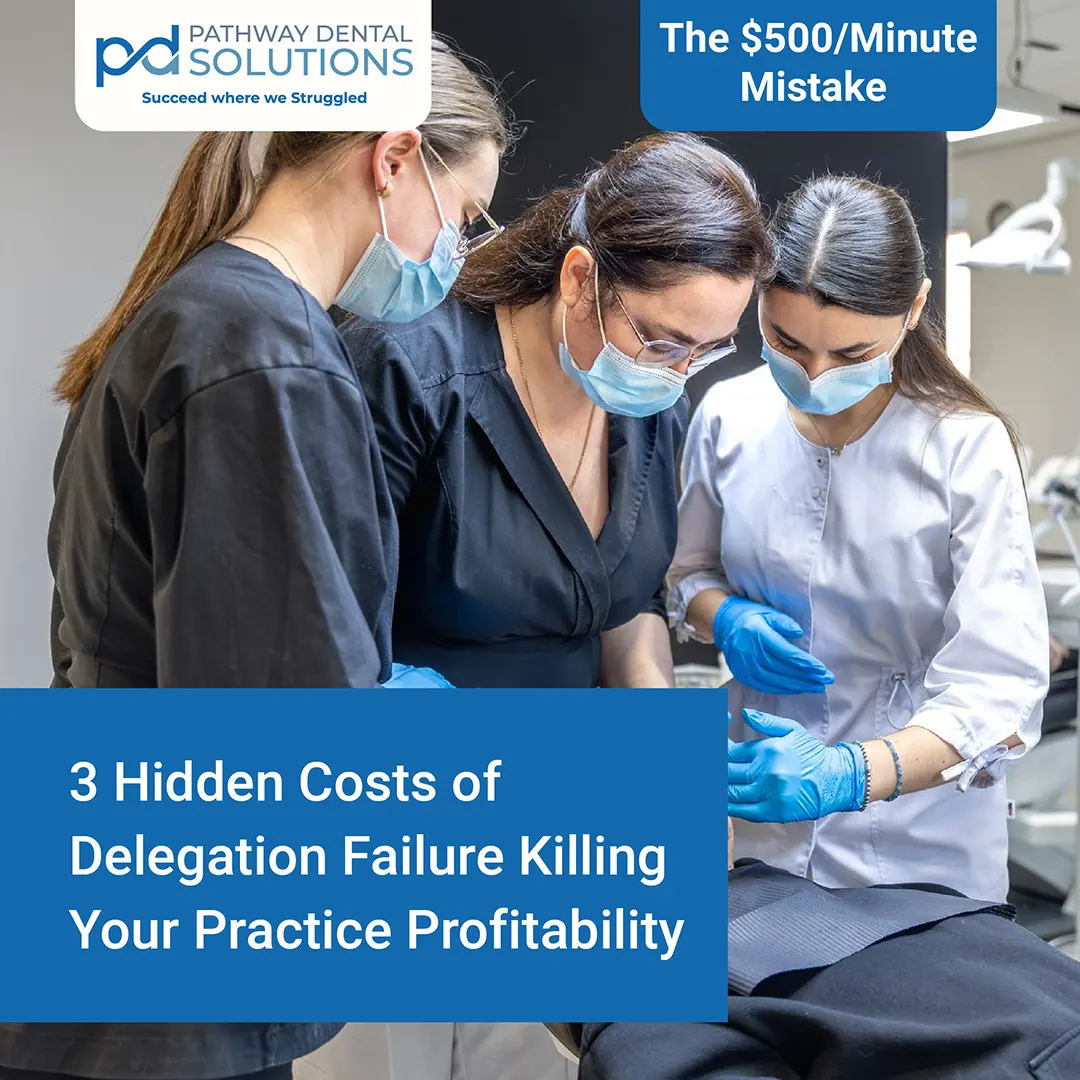
The $500/Minute Mistake: 3 Hidden Costs of Delegation Failure Killing Your Practice Profitability
As a practice owner or CEO striving to scale, you track your metrics: Production, Collections, and Overhead. But there’s a sneaky line item that’s bleeding your profit margin dry—the hidden tax of non-delegation.
Many of your associate doctors, often high-skilled clinicians, are inadvertently sabotaging their own efficiency and your entire practice flow. They are addicted to control, spending precious minutes on tasks that do not require a DDS degree—like sending records, post-processing scans, or even answering patient emails.
If your practice feels sluggish and your associate production targets are perpetually missed, stop auditing your team’s workflow. Start auditing your doctor’s to-do list.
Dr. Sten Ericson’s recent return to the operatory exposed this startling truth: a minute spent on administrative work is a minute stolen from revenue. If you want to scale a thriving practice, you must eliminate the non-doctor tasks from your doctor’s day.
Here are the three non-negotiable costs your struggling practice pays when doctors refuse to delegate effectively.
- The Cost of Lost Production Time (The Revenue Leak)
This is the most straightforward, yet most ignored, financial loss. Your doctor’s time in the chair is the engine of your practice. Every minute they spend on a non-doctor task is an immediate, measurable revenue leak.
The Stark Math: If your general dentist is on target for $500 in Production Per Hour (PPH), then every minute of their time is worth approximately $8.33. When that doctor spends 20 minutes “Slacking a CT” or emailing a patient, your practice just lost $166 in immediate production opportunity. This is money that could have been earned by starting the next restorative procedure on time. This inefficiency snowballs, directly leading to missed production targets, costly overtime, and, critically, associate burnout.
The CEO Solution: Standardize to the License.
Your standard operating procedures (SOPs) must be simple: The doctor’s role is to diagnose and treat. Full stop. Train your team to handle all ancillary tasks (administrative, logistical, and preparatory). Implement a culture of leadership by momentum where the doctor moves efficiently, forcing the highly trained team to “just keep up” and manage all non-clinical responsibilities.
- The Cost of Enabling Underperformance (The Control Trap)
When a doctor constantly intervenes—taking over the charting, adjusting the instrument setup, or insisting on submitting the lab case personally—they send a crippling message to the entire team: “I don’t trust you to do this correctly.”
The Painful Loop: As observed by Dr. Ericson and Jennifer Paxton, team members often execute tasks poorly (or delay them) specifically because they know the doctor will eventually “take over.” This creates a codependent, low-performing cycle. The doctor enables the team’s underperformance, and the team provides an excuse for the doctor’s control addiction. This prevents assistants and hygienists from ever achieving the skill and confidence needed to become true operational efficiency drivers.
The CEO Solution: Release Control to Empower Ownership.
Adopt the principle that the assistant is the “owner” of the operatory, and the doctor is the “invited clinical expert.” Give the assistant full, non-negotiable responsibility for their op’s flow, inventory, setup, and teardown. When they own it, their pride drives performance. When mistakes happen, they become high-value teaching moments for the whole team, not an excuse for the doctor to reclaim control. This is the foundation of a high-trust, high-production culture. (Related: How Doctor-Assistant Friction is Costing Your Dental Practice Profit)
- The Cost of Reduced Quality (The Rushed Result)
Many doctors justify holding onto non-clinical tasks—like post-processing iTero scans or writing detailed lab narratives—under the guise of “quality control.” Ironically, this retention of work often leads to a measurable decline in quality.
The Rushed Result: When the doctor performs administrative work, they usually do it in a hurry at the end of the day, after clinical details have faded, and when they are physically and mentally fatigued. Their focus is split, and the quality of the administrative work—the lab prescription, the scan notes, the charting accuracy—suffers. Furthermore, research consistently links efficient patient flow and staff utilization to improved patient satisfaction scores, reinforcing that speed born of mastery is the path to quality. (Source: Peak Dental Practice Efficiency: A Blueprint)
The CEO Solution: Time-Lock Delegation.
The solution is to time-lock the administrative task to the moment of peak knowledge. The doctor should dictate or quickly review the scan immediately after the prep is complete while the assistant is present. The assistant is then fully responsible for the immediate submission and tracking. By enforcing the completion of the delegated task right away, the information is maximized, the doctor’s mental bandwidth is protected, and the focus remains solely on the next revenue-producing patient.
Are you ready to audit your schedule for non-doctor tasks and finally address the “control trap” that’s limiting your growth?
Our Doctor Success Program is designed to equip your leadership team with the operational SOPs and coaching frameworks necessary to transition your associates from individual contributors to highly productive, system-dependent professionals.
➡️ Discover how we can eliminate the hidden tax on your practice: Pathway Dental Solutions



